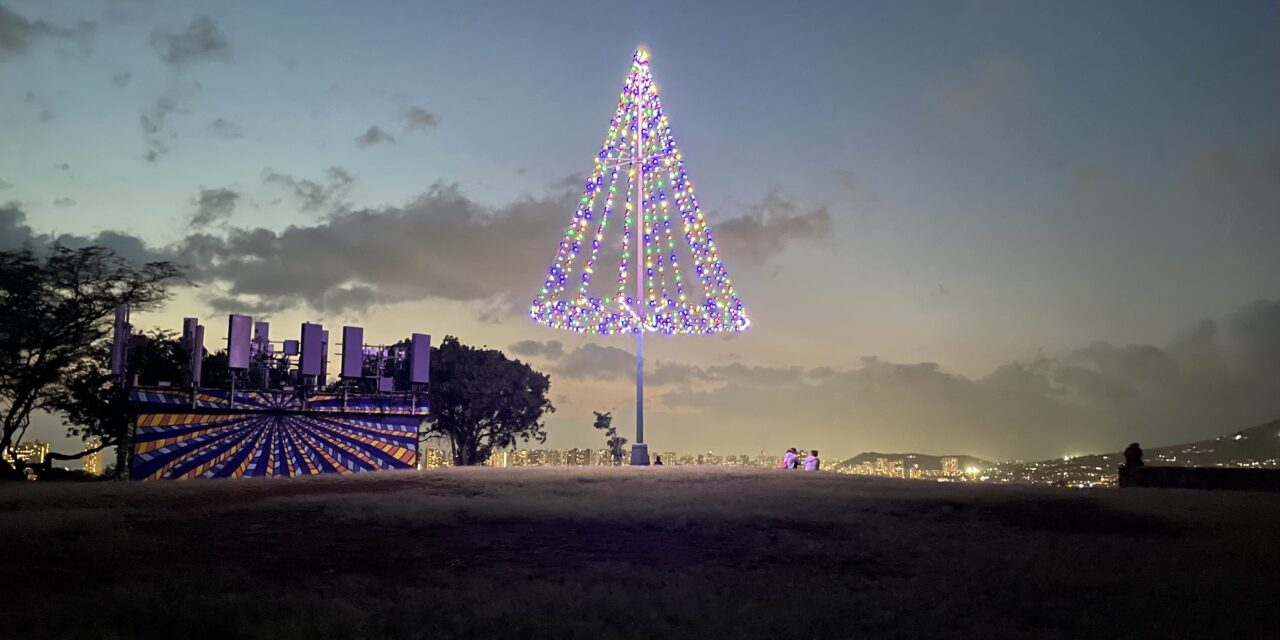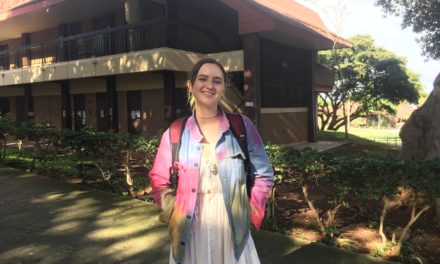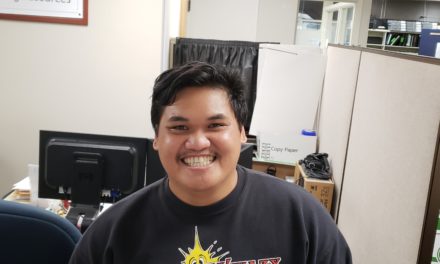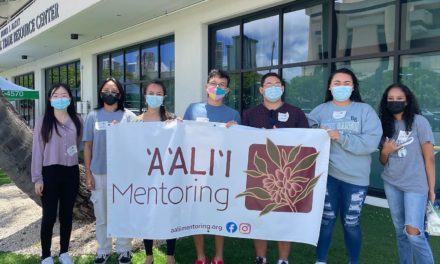The closest I’ll get to having a tree is visiting Christmas Tree park in Kaimukī. (Photo by Sarah Burchard)
By Sarah Burchard | Staff Writer
The holidays aren’t for everyone.
Without question, they provide an excuse for gathering with family and friends, and if one should succumb to the duties of gift giving, decorating and cooking for large groups (in which there will likely be at least one relative you must also put up for the night), then you have signed yourself up for weeks of stress, chaos and the perpetual reimagining of leftovers.
My partner Harri and I celebrated the holidays vastly differently growing up. I had what he would call the “stereotypical white household” experience with turkey and Christmas lights and gifts under the tree. Harri, a second-generation non-trinitarian Filipino from Kalihi, didn’t celebrate the holidays at all. (The holy trinity is the key doctrine for why Christians and Catholics celebrate Christmas. His family practiced a different type of Christianity that did not believe in the holy trinity.)
I lived in San Diego, California as a kid. My mom, aunt and grandparents, all born in Indiana, moved to the suburbs of San Diego when my mom was 10 and brought their Midwest holiday traditions with them. My mom purchased eggnog and fresh walnuts from the grocery store. My grandpa brought the Sees Candies box of assorted chocolates. My grandma made 4-5 different kinds of pie for Thanksgiving and her famous date bars sprinkled in powdered sugar for Christmas. My aunt and uncle were the queen and king of gag gifts. Before Christmas dinner we’d sip eggnog and crack walnuts while Christmas music played on the stereo. After dinner, Mom would play Christmas carols on the piano, and I’d beg to open at least one gift before bedtime.
Interestingly, Harri and I both ended up with careers in the restaurant business after graduating high school, and the idea of celebrating holidays, whether part of family tradition or not, became obsolete. As most restaurants are open during the holidays, and it is their busiest time of the year, holidays now equated to spending long hours at work. As the years passed, and I continued to be absent from holiday family gatherings, I lost my interest in the holidays completely. I didn’t have enough money to buy gifts, I didn’t have time to decorate my home and then clean it all up afterward, and I couldn’t take time off to travel home. My family, especially my mom, had a hard time understanding my apathy for the months of November and December, and I inherited the persona of Scrooge.
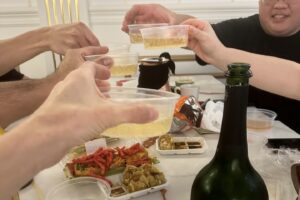
Celebrating New Years with my boyfriend and his staff at his restaurant after hours. (Photo by Sarah Burchard)
When I met Harri, I was thrilled to find my non-traditionalist match. For the first four years of our relationship we both worked on Thanksgiving and Christmas. The only hint of the holidays in our relationship was a gift exchange between him and I on Christmas morning. No tree, no gingerbread pancakes, just one gift for him and one gift for me, and then off to work we’d go.
From age 18 to 43, I celebrated a handful of holidays. When the opportunity presented itself, I enjoyed going out to eat at my favorite restaurants or stopping by my neighborhood bar for a drink on Christmas evening if I had the night off. This is the way the restaurant industry celebrates. They spend time with their restaurant family and friends eating great food and drinking (sometimes a little too much). I even found time one year to bake cookies for the staff at La Vie in Waikīkī. That’s the kind of holiday cheer I like to spread – making someone’s night at work a little sweeter.
The truth is, in Hawaiʻi, Thanksgiving and Christmas are settler colonizer holidays. While thousands of people in Hawaiʻi celebrated Thanksgiving on November 28, Native Hawaiians were celebrating Lā Kūʻokoʻa (Hawaiian Independence Day). Makahiki (a new year’s celebration that historically featured communal feasts and games when wars were forbidden) is the December tradition of our host culture in the islands when Westerners celebrate Christmas and New Years.
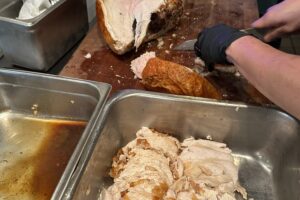
Typically, restaurant workers celebrate holidays at work with a special staff meal. (Photo by Sarah Burchard)
Do you have to celebrate the holidays just because you were raised to do so? The answer to that question has always been a no for me. It isn’t intended to be an insult to my family or heritage; it is simply a shift in lifestyle that happened organically over time. So while the shops and malls are filled with shoppers scrambling to mark off their Christmas lists, as churches and community centers pack in, as traffic slows in the evening down King Street to enjoy the bright lights and shaka-throwing-Santa at the Honolulu Hale, there will be those who will take the backstreet to avoid the crowds and opt out of celebrating religious events of a religion they don’t even practice and paying off bills instead of going into debt.
Life is challenging enough. Life during the holidays is even worse. They exist to increase consumer spending, some say. They are a time to spend time with the ones you love, others believe. And while I’m all for the latter, November through December – when lines are long and days are short – are just, in my mind, the last two months of the year to survive until we reset to a steadier speed in January. It is safe to say, the holidays aren’t for everyone, at least not for me.

